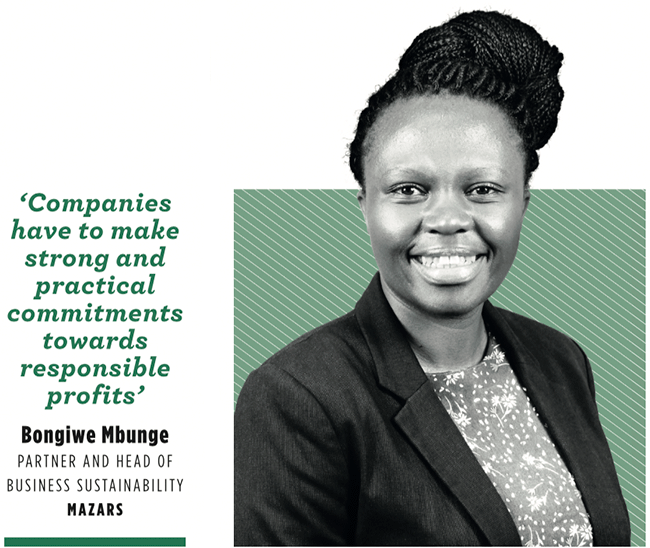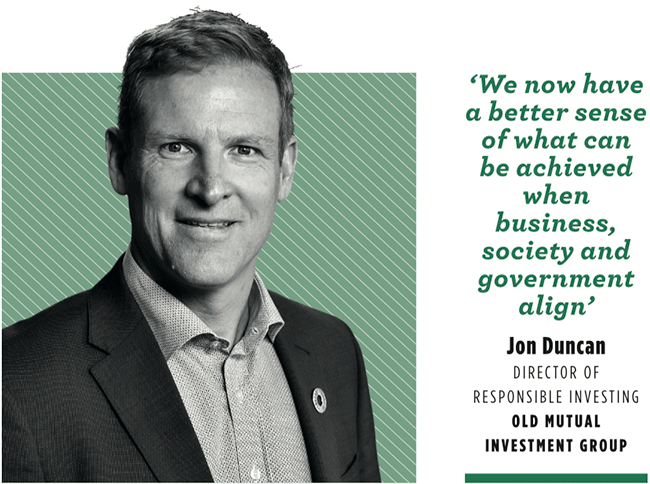Gone are the days when business was simply about making money. ‘Since 1994 companies have been explicitly expected to be involved in the transformation of South African society, and this expectation has deepened since the COVID-19 pandemic,’ says Arnold Smit, head of business in society at the University of Stellenbosch Business School (USB). ‘Whatever way the corporate pandemic response went, no company can deny its embeddedness and interdependence of the social context within which it operates. The conversation is now about business purpose and what the business can do to improve society. Social well-being and goodwill are positive for business continuity and sustainability; social fragmentation and upheaval are not.’ Or, as Jon Duncan, director of responsible investing at Old Mutual Investment Group, puts it, ‘we live in an interconnected world of social, environmental and market systems, so our view – through the lens of the listed equity market – is that if the biophysical systems fail, societies fail, and consequently the markets fail too’.
It’s therefore in everybody’s interest to strengthen these systems. However, this is a monumental task for post-COVID SA, which – according to Smit – finds itself in a vulnerable and fragmented space, with society ‘squashed between a struggling economy and a strained ecological environment’. He says the country needs a collaborative effort between business, government and civil society to map a way out of the current quagmire. This is propagated in the last of the 17 UN Social Development Goals (SDG17: partnerships for the goals), which underlines the need for cross-sector and cross-country collaboration in a shared mission to achieve the world’s SDGs by 2030.
‘Companies are slowly but surely beginning to report on the SDGs that represent the risks most salient to their business activities,’ according to Mazars. The audit, tax and advisory firm assists corporates in using the SDGs to create greater value for all – for example, by educating global boards, identifying the risks on which to focus, implementing new processes, or providing assurance on non-financial reporting.
‘South African companies have to make strong and practical commitments towards responsible profits,’ says Bongiwe Mbunge, partner and head of business sustainability at Mazars in Cape Town. ‘The SDGs bring easier and practical dimensions to integrate into business strategies, as a solution to extend value creation beyond the parameters of profit. Concentration of efforts to the key SDGs in lowering our inequality remains a lower-hanging fruit. The output will be impactful, produce comparable data and attend to our macro sustainability issues.’

In line with this, SA is experiencing a renewed call for a social compact to create social cohesion and consensus around the economic recovery plan. At national level, President Cyril Ramaphosa has been urging business, labour, community and the government to sign a social compact ‘to restructure the economy and achieve inclusive growth’. In the same spirit, the Indlulamithi South Africa Scenarios 2030 project, which is a multi-stakeholder initiative funded by big business, also endorses a social compact as a viable instrument for building common purpose and recovery.
‘This is our moment to step up and make the social compact, and follow the examples of countries that have been able to rebuild their economies and reconstruct their societies on the back of a social compact, such as South Korea, Singapore, the Netherlands, Sweden, Ireland and Rwanda,’ says Andile Sangqu, who chairs the Indlulamithi Scenarios executive team and is the former head of Anglo American South Africa. Speaking at the Scenarios’ 2020 report-back meeting, he said that ‘the social compact must be in the form of a dialogue, either at industry level or at sectoral level, provincially or nationally, to promote the interest of all partners. Through social dialogue, consultation and information-sharing should be encouraged between partners to work towards common interests’.
However, some critics are asking for clarity regarding the exact terms and conditions for such a compact, and demand that the focus should be more on action and less on theory and discussions. While Duncan agrees that social contracts can sometimes be vacuous and lofty, with little buy-in, he argues that they can be very useful in galvanising social action when carefully constructed and thought through.
‘Social compacts are very much a feature of South Africa in the post-apartheid era, with Nedlac historically being one of the places where such contracts have been brokered. I would say they are net-positive artefacts in society. ‘In fact, we’ve only been able to move forward from the pandemic on the basis of a kind of social compact with business,’ he adds. ‘I would argue that as a result of COVID-19, we now have a better sense of what can be achieved when business, society and government align.’
At company level, organisations are already used to making corporate compacts with their workforce – for example, through their health and wellness programmes, says Duncan. He further refers to their compacts with the customers, in terms of quality, service and other aspects.
For business continuity and long-term success, any company depends on good and meaningful relationships with its stakeholders, which include investors, regulators, customers, suppliers, staff and communities. ‘There is also good reason nowadays for including the environmental ecosystem as a stakeholder or beneficiary,’ says Smit. ‘The challenge for business leadership is to align the interests and expectations of all these stakeholders behind a compelling purpose, especially one that is ethical, responsible and sustainable in both financial and moral terms. ‘The challenge is not about prioritising one stakeholder category over another, but to realise that the whole ecosystem of participating stakeholders is interconnected, and that unthoughtful forms of prioritisation – for example, shareholders over the rest, or staff at the cost of customers – may jeopardise continuity and sustainability.’

Yet there has been a clear trend that shows employees are now one of the most important stakeholder groups for companies. ‘Nobody would have expected it five years ago, but there’s definitely been a shift, and companies are doing more than ever for the benefit of society, and in particular their workforce,’ says Cathy Duff, director at corporate responsibility consultancy Trialogue.
‘For most companies, the first COVID response was to turn inwards: to look after their employees in whatever way they could – be it their safety, physical health, mental well-being, or their financial situation.’ Quoting the 2021 Edelman Trust Barometer, she explains that, globally, people now trust business more than any other institution, and are looking to business leaders to solve the societal challenges that have been exacerbated by the pandemic. The annual barometer, which is based on surveys of more than 33 000 adults in 28 nations and was conducted in Q3/2020, found that the pandemic has accelerated the erosion of trust around the world. ‘When the barometer was launched just over 20 years ago, non-profit organisations were more trusted than business, government and media,’ says Duff. ‘This has changed, as business is now the most trusted institution and the only one seen as both ethical and competent.’
She explains that more than three in four South Africans believe that CEOs should step in where government does not adequately address societal issues, such as education and training, unemployment, healthcare and poverty. ‘Employees trust information from their companies – for example, their internal newsletter – more than they trust government or media information. And 95% of South African respondents expect CEOs to publicly speak out on societal challenges. This is a big shift.’
In the past, solving societal or environmental problems in your business model was something you did after you made a profit, says Duncan. ‘Today, the concept of shared value proposes that the best profit-making model on the planet is one that generates profit while at the same time solving for long-term social and environmental risk.’ He defines shared value as ‘a technical term that refers to strategic intent and one that can be unlocked when a corporate purpose goes beyond pure profit-making at all costs’. And this is the reason why companies operating in SA need to understand that contributing to education and training, supplier and enterprise development and the empowerment of local communities isn’t voluntary or an act of philanthropy. It is absolutely crucial for the country’s economic recovery, transformation and social cohesion, which ultimately will determine the long-term sustainability of all businesses.








